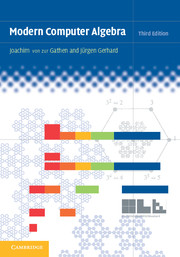Book contents
- Frontmatter
- Contents
- Introduction
- 1 Cyclohexane, cryptography, codes, and computer algebra
- I Euclid
- II Newton
- III Gauß
- 14 Factoring polynomials over finite fields
- 15 Hensel lifting and factoring polynomials
- 16 Short vectors in lattices
- 17 Applications of basis reduction
- IV Fermat
- V Hilbert
- Appendix
- Sources of illustrations
- Sources of quotations
- List of algorithms
- List of figures and tables
- References
- List of notation
- Index
- The Holy Qur'ān (732)
14 - Factoring polynomials over finite fields
from III - Gauß
Published online by Cambridge University Press: 05 May 2013
- Frontmatter
- Contents
- Introduction
- 1 Cyclohexane, cryptography, codes, and computer algebra
- I Euclid
- II Newton
- III Gauß
- 14 Factoring polynomials over finite fields
- 15 Hensel lifting and factoring polynomials
- 16 Short vectors in lattices
- 17 Applications of basis reduction
- IV Fermat
- V Hilbert
- Appendix
- Sources of illustrations
- Sources of quotations
- List of algorithms
- List of figures and tables
- References
- List of notation
- Index
- The Holy Qur'ān (732)
Summary
In this chapter, we present several algorithms for the factorization of univariate polynomials over finite fields. The two central steps are distinct-degree factorization, where irreducible factors of distinct degrees are separated from each other, and equal-degree factorization, where all irreducible factors of the input polynomial have the same degree. The reader who is happy with the basic result of probabilistic polynomial-time factorization only has to go up to Section 14.4. The remaining sections discuss root finding (14.5), squarefree factorization (14.6), faster algorithms (14.7), methods using a different approach based on linear algebra (14.8), and the construction of irreducible polynomials and BCH codes (14.9 and 14.10). The implementations, briefly described in Section 15.7, show that this is an area where computer algebra has been tremendously successful: we can now factor enormously large polynomials.
Factorization of polynomials
The fundamental theorem of number theory states that every integer can be (essentially uniquely) factored as a product of primes. Similarly, for any field F the polynomials in F[x1,…,xn] can be (essentially uniquely) factored into a product of irreducible polynomials. In other words, ℤ and F[x1,…,xn] are Unique Factorization Domains (Sections 6.2, 25.2).
Information
- Type
- Chapter
- Information
- Modern Computer Algebra , pp. 377 - 432Publisher: Cambridge University PressPrint publication year: 2013
